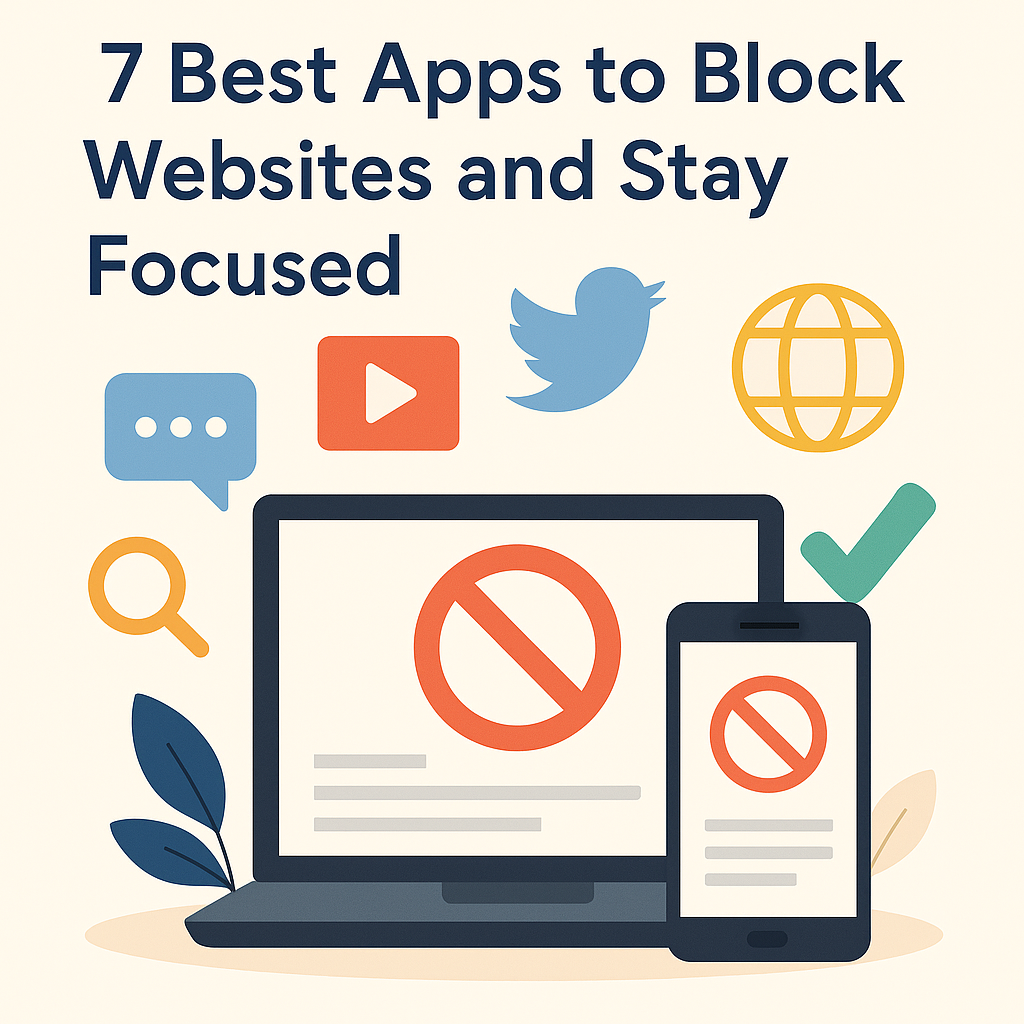The best apps to block websites aren’t about restriction — they’re about freedom to focus.
If you’re constantly pulled into social media, news cycles, or inbox refreshes, it’s not a willpower issue — it’s a system design problem. The best apps to block websites give you back control over your time, attention, and mental clarity. Whether you’re trying to finish deep work, study for exams, or simply reclaim your evenings, the right app can create digital boundaries that stick. Let’s explore the best tools that keep distractions out — and your momentum intact.

What Makes Website Blockers So Effective
It’s not just about removing access. The best apps to block websites change how you behave. By breaking the cue-reward cycle of distraction, they reduce mental fatigue and help rebuild attention stamina. You start finishing more — and switching less.
Apps like Freedom let you schedule full-device blocks across mobile and desktop. Others, like Cold Turkey, are unbreakable by design — perfect for creators or developers who need strict control. These tools don’t just nudge you — they enforce focus boundaries that stick.
The psychological benefit? Simplicity. When distraction is off the table, your brain has more bandwidth for what actually matters.
Choosing the Best App for Your Platform and Triggers
Start with your devices. Are you working in Chrome, macOS, Android, or all of the above? The best apps to block websites integrate natively — whether that’s browser extensions like LeechBlock or full system apps like FocusMe.
Then audit your triggers. Is it Reddit? YouTube? News? These apps let you target specific domains or categories. Stay Focused, for instance, limits sites by time of day. BlockSite adds content filtering and smart routines. The best blockers meet you where your friction lives — and remove it.
Lastly, choose your level of strictness. Some people need hardcore enforcement (Cold Turkey). Others thrive with gentler prompts (RescueTime). Match your tool to your tolerance.
How Blocking Apps Rebuild Productive Momentum
Distraction isn’t neutral. It fragments attention, weakens decision-making, and triggers context-switching fatigue. The best apps to block websites reverse this by enforcing friction. The moment you try to visit a blocked site and can’t — you’re forced to pause, reset, and return to intention.
This isn’t about shame or discipline. It’s about reducing decision load. Fewer choices = more clarity. That’s the secret power of blockers: they quiet the noise without you needing to think about it.
When used consistently, these tools restore momentum. Your work feels smoother, sessions get longer, and focus starts to feel natural again.
Behavioral Science Behind Digital Self-Control
Research in habit formation and decision science confirms the power of removing cues. The best apps to block websites use this principle to eliminate triggers — and replace them with calm defaults. That’s why even lightweight blockers lead to stronger habits over time.
Apps like One Sec insert delay barriers before opening addictive sites. RescueTime gives weekly reports on time spent — turning awareness into accountability. These interventions lower activation energy for focus while raising the cost of distraction.
That’s the magic: blockers create behavior friction for bad habits and behavior fluency for good ones.
What the Experts Recommend for Distraction Management
According to this Zapier guide on website blockers, the most effective tools balance control with flexibility. Hardcore apps like Cold Turkey work for writers and coders, while more adaptive blockers like Freedom support deep work in flexible sprints.
The best apps to block websites also include calendar-based rules, Pomodoro syncing, and context-aware profiles. This isn’t about rigid control. It’s about matching energy levels with intentional limits — and protecting your best hours.
Need browser-based vs desktop enforcement? Mobile blocking vs desktop? Your app should match how (and where) you work.
How to Integrate Website Blocking Into Your Daily Workflow
Don’t treat blocking as a last resort. Use it as a proactive structure. Start your day by scheduling blocks around your most valuable windows. The best apps to block websites allow you to precommit — not just react to distractions.
Freedom and FocusMe let you create recurring sessions synced with your calendar. Cold Turkey blocks everything until the work is done. For lighter flow states, RescueTime automates sessions based on your habits.
Want to deepen results? Pair your blocker with a focus timer like Session or Forest. Use one tool to control inputs, another to structure outputs.
Which Website Blocker Fits Your Focus Personality?
The truth? No tool works if it’s not used. The best apps to block websites are the ones you’ll actually stick with. Casual users often start with BlockSite or Stay Focused. Power users swear by FocusMe or Cold Turkey. Creatives may lean on Forest or One Sec.
The key is friction. Your ideal blocker should reduce decision fatigue without adding frustration. You want it to feel like an ally — not a punishment.
Test 2–3 options over a week. Measure not just blocked time, but how much easier it becomes to enter flow. That’s the goal.
Final Thoughts
Website blockers aren’t about control — they’re about clarity. The best apps to block websites free your brain from noise, help you stay aligned with your priorities, and make deep work sustainable. When used intentionally, they shift your default state from distraction to direction.
Focus isn’t something you summon. It’s something you design. And these tools give you the design layer most of us are missing. Try one today — and see what happens when nothing interrupts you.
Ready to Take Action?
Start applying these best apps to block websites today — and reclaim your focus with structure, not stress.
Explore More on Best Apps to Block Websites
Want to dive deeper? These resources expand your understanding of best apps to block websites in real-world workflows:
